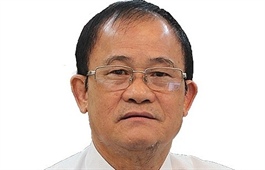Writing off bad debt assets an attempt to whitewash
Writing off bad debt assets an attempt to whitewash
Although the Vietnam Asset Management Company (VAMC) is racing against time to clear a backlog of bad debts, it is becoming impossible to write off assets of bad debts. Credit institutions and some banks are optimistic in taking back collateral to benefit shareholders, but writing off bad debts is not possible, because assets that are bad debts will still remain.
Illustrative photo.
|
Banks in dilemma
Recently, commercial banks have been rushing to sell off real estate assets, cars on loan-terms, factories with land use rights, ownership of houses and several other assets attached to land and commercial real estate projects. The value of these assets comes to a few hundred million, to thousands of billion dong. Selling off real assets of bad debts to recover capital is not a new phenomena. What is remarkable about this is that this year with the economy so badly impacted by the Covid-19 pandemic, and businesses facing all round crisis situations, the amount of assets for sale have increased many times compared to one or two years ago and prices have also been continuously decreasing.
The reason for this unfortunate phenomenon can be explained by one financial expert, who said that instead of a bank holding debt or holding real estate, it is willing to sell and reduce prices to gain back as much as possible. In some areas, market prices have become seriously affected and the sooner debts are resolved the better it will be for banks. However, the key issue is that according to the 2019 to 2020 roadmap, this is the time when banks have to settle all debts for real estate sold to VAMC.
Activities of VAMC for the years 2013 until 2016 show that results of buying debts via special bonds in 2013 reached VND 36,257 bn, and in 2014 they had reached VND 92,448 bn. The peak in 2015 brought the non-performing ratio (NPL) down to 3%, and VAMC bought VND 109,264 bn. According to regulations, credit institutions must annually deduct 20% of their risk provision and after five years return them to credit institutions, if during this time VAMC cannot sell off debts. Out of a total of VND 253,015 bn of bad debts purchased from credit institutions until 31 December 2016, VAMC only recovered VND 50,169 bn, accounting for 19.8% of total purchased debt.
As VAMC debt collection has been ineffective, from 2019 until now, banks have been forced to settle bad debts at VAMC. Up until now, Vietcombank, Techcombank, MB, VIB, OCB, Nam A Bank, TPBank, Kienlongbank, VPBank, Agribank, and SeABank MSB have achieved this goal. In addition, a number of banks such as ABBank and Eximbank have also set a target to buy back all debts sold to VAMC in 2020. Therefore, the special assets that were taken back need to be processed to recover capital. This also pushes the amount of goods listed for sale by banks on the market to increase rapidly.
Protecting shareholders
There is an explanation in writing off bad debts at VAMC by banks as a way for banks to protect shareholder interests. According to Circular 32/2019 which amended and supplemented a number of articles of Circular 19/2013 of the State Bank of Vietnam, as from 14 February 2020, credit institutions selling debts and receiving special bonds do not have to pay cash dividends until special bonds are paid. A credit institution selling a debt and receiving a special bond with a term of more than five years, or a credit institution approved by the State Bank of Vietnam to extend the term of a special bond may not pay dividends, to create a source of handling bad debts until a special bond has a term of more than five years. This means that when the bad debts are settled on time, banks will be allowed to pay dividends to shareholders.
In essence, the provisions in Circular 08/2016 which amended and supplemented a number of articles of Circular 19/2013 of the State Bank of Vietnam, although allowing credit institutions to extend the term of special bonds upto ten years, only apply to using dividends for credit institutions implementing restructuring plans according to approved project. Credit institutions having financial difficulties but the provisioning for special bonds that can lead to losses in the fiscal year cannot pay dividends.
Another fact shows that after settling bad debts at VAMC, banks still have to take care of their own status first. Techcombank has written off debt in 2019, but still continues to not pay dividends for the 9th year, retaining profits to supplement business capital. Similarly, VPBank also submitted to shareholders to retain all profits in 2019 to increase equity. In fact, this year the State Bank of Vietnam requires no cash dividend to have resources to sharply reduce lending interest rates, and banks immediately responded and urgently paid dividends by shares earlier than previous years.
Thus, after many years of waiting for the bank to settle debts, shareholders have not yet received benefits, because after taking the real property not yet sold, the on-balance-sheet bad debt increased, especially in Debt Group 5. Thus banks had to struggle to auction their assets to recover debts by themselves. For example, Agribank and BIDV, although cleared bad debts at VAMC, each time they advertise, they still cannot find a new owner.
Previously, when VAMC was established, an economist expected that VAMC would not give money but give special bonds, equivalent to the value of the sold asset when a bank sold debt. During that time, each year the bank makes a provision for risks, so after five years, most of those special bonds have full provisions, which can be used to buy back debt. When banks take back such real assets, they will sell themselves at any price depending on the bank, and not dominated by VAMC. Because this asset has full compensation provision, it is considered that the retained profits of the bank thereby increase. When banks get stronger, shareholders will be the beneficiaries.
However, with the current progress being made in handling real assets, the time to benefit from them is very far indeed, and many forecast that bad debts may take upto two or three years, and in some cases even five years, to be processed in entirety. Under the prevailing unusual circumstances, where the Covid-19 pandemic is unrelentingly overwhelming all aspects of the economy, the expectation that bad debts will be dealt with soon is an optimistic thought, rather bad debt may even increase causing more burden on commercial banks. Many banks are now only planning to settle debts at VAMC to ease this ongoing pressure.

















